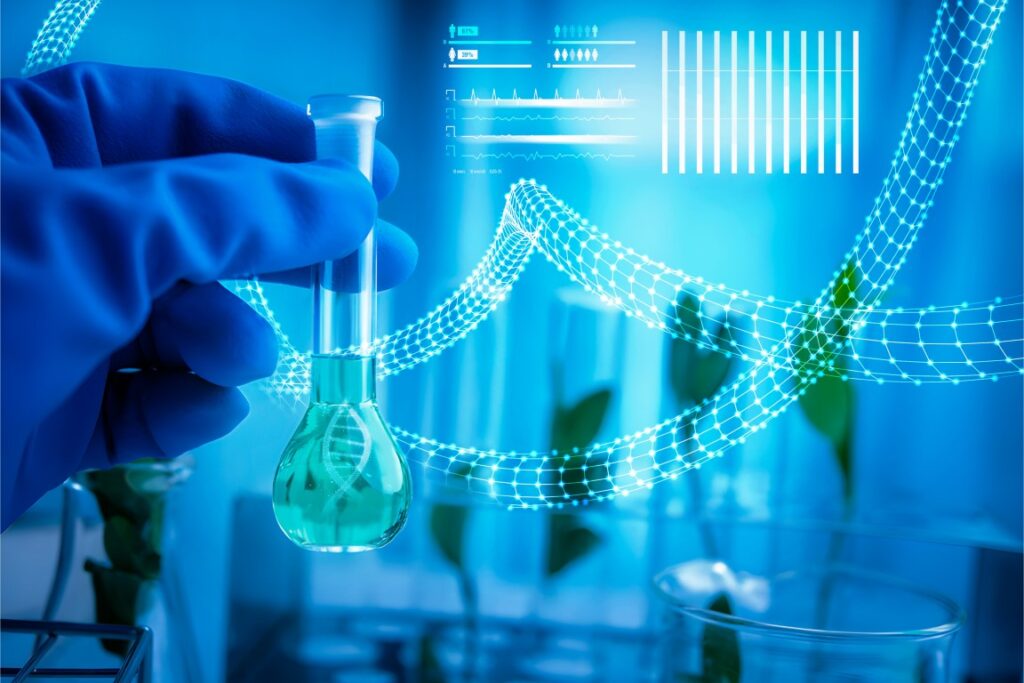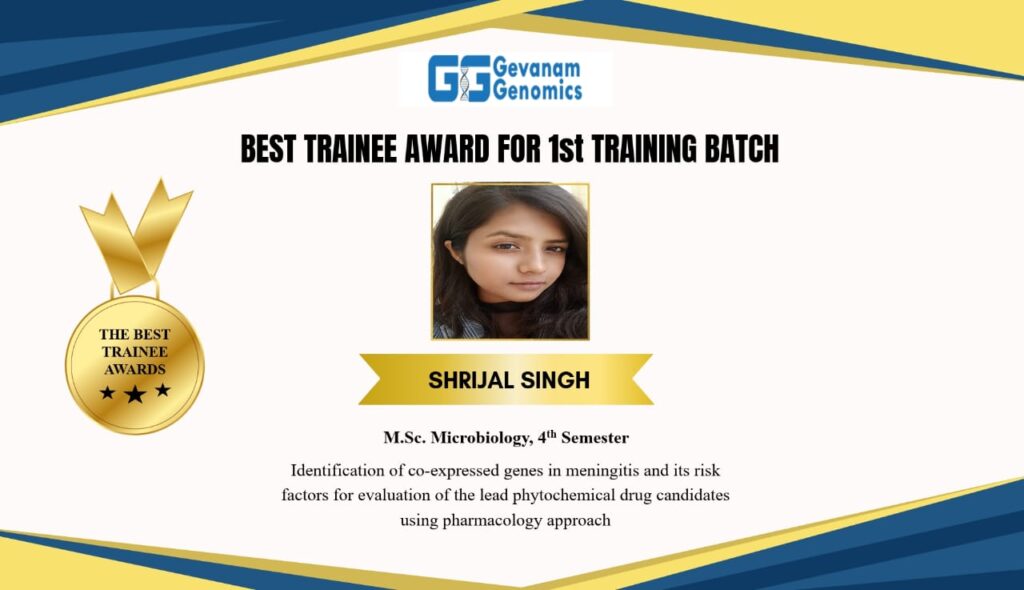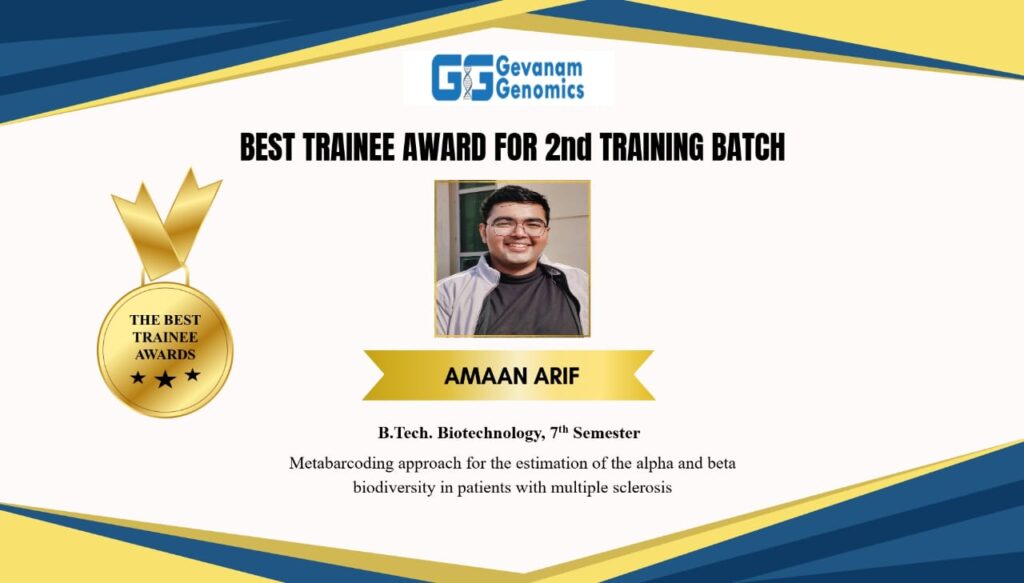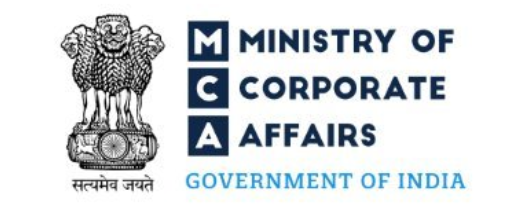Training
TRAINING MODULES CATEGORIES
Areas of Bioinformatics
- Basic “bioinformatics and programming”
- Genomics for Beginners
- Drug Discovery for Beginners
- Protein Structural Biology for Beginners
- Programming for Bioinformatics
- Advanced Genomics (Pipeline development, analysis interpretation, Multiomics) + Project
- Advanced drug discovery and structural biology + Project
- Artificial Intelligence and Machine Learning
- Customized learning for Bioinformatics + Project
- Projects, dissertation and content writing for Bioinformatics (specific)

1. Basic
“Bio-Informatics and Programming”
1. Basic
“Bio-Informatics and Programming”
Defining & Understanding of Bioinformatics
Understanding genes, proteins and drug discovery process (HL)
Understanding biological databases (NCBI, PDB, EBI, DrugBank, KEGG, GEO)
Understanding Bioinformatics Tools (MSA, BLAST, basic tools)
Basic beginner insights about protein modelling, simulations, drug discovery – structural biology
Basic beginner about genomics, proteomics and statistical analysis
Standard bioinformatics applications and use cases
Career in Bioinformatics and advancements.
Understanding genes, proteins and drug discovery process (HL)
Understanding biological databases (NCBI, PDB, EBI, DrugBank, KEGG, GEO)
Understanding Bioinformatics Tools (MSA, BLAST, basic tools)
Basic beginner insights about protein modelling, simulations, drug discovery – structural biology
Basic beginner about genomics, proteomics and statistical analysis
Standard bioinformatics applications and use cases
Career in Bioinformatics and advancements.
2. Genomics for Beginners
Understanding stages of Genome Sequencing (Sanger, NGS and
Third Gen)
Understanding how sequencing works (HL wetlab)
Understanding what is DNASEQ, RNASEQ, scRNA, Metagenomics and Microarray based technologies
Understanding what is primary, secondary and tertiary analysis in genomics
Understanding what career advancements, we can have in Genomics
Understanding two pipelines, DNASEQ and RNASEQ with standard tools
Project or case study and dissertation on it with real-time data
Understanding how sequencing works (HL wetlab)
Understanding what is DNASEQ, RNASEQ, scRNA, Metagenomics and Microarray based technologies
Understanding what is primary, secondary and tertiary analysis in genomics
Understanding what career advancements, we can have in Genomics
Understanding two pipelines, DNASEQ and RNASEQ with standard tools
Project or case study and dissertation on it with real-time data
3. Drug discovery for Beginners
Proteins and drug molecules – structure
Explain protein and drug molecules – primary secondary and tertiary structure
Basics of Protein structure prediction, types of predictions and what results we get
Basics of Drug discovery process – like docking, qsar and virtual screening
Basics of drug life cycle
Databases used in entire process and how to interpret or understand the data (some examples of databases)
Basics of MD simulations, what and why we do.
Explain protein and drug molecules – primary secondary and tertiary structure
Basics of Protein structure prediction, types of predictions and what results we get
Basics of Drug discovery process – like docking, qsar and virtual screening
Basics of drug life cycle
Databases used in entire process and how to interpret or understand the data (some examples of databases)
Basics of MD simulations, what and why we do.
4. Protein Structural Biology for Beginners
Protein MD Simulations.
- What and how we do simulations
- All types of force fields, using NAMD, AMBER, GROMACS, etc
- Software's or tools used, how we do, Handson for doing live analysis.
Protein structure prediction.
- Types of prediction
- How to predict, various prediction real-time hands-on
- Result interpretation and how to analyse them
- Real scientific bioinformatics use cases for this.
5. Programming for Bioinformatics
R basic packages
Python basic packages
Shell scripting Linux beginner + advanced
Workflow managers – Nextflow, etc
Dockers and Containers – for bioinformatics
Python basic packages
Shell scripting Linux beginner + advanced
Workflow managers – Nextflow, etc
Dockers and Containers – for bioinformatics
6. Advanced Genomics
Pipeline development practices in Genomics
Pipelines for DNASEQ, RNASEQ, scRNA, Metagenomics, Microarray, etc
Understanding all databases involved in Genomics (interpretation and downstream analysis)
NGS data interpretation – clinical, population genomics, ancestry genomics and ngs in drug discovery process (pharmacogenomics)
Genomics databases involved in primary, secondary and tertiary analysis (genotype, phenotype and pharmacogenomics)
Multiomics definition – proteomics and metabolomics, what are they
Real examples and hands on using public data
Project or internship on it
Pipelines for DNASEQ, RNASEQ, scRNA, Metagenomics, Microarray, etc
Understanding all databases involved in Genomics (interpretation and downstream analysis)
NGS data interpretation – clinical, population genomics, ancestry genomics and ngs in drug discovery process (pharmacogenomics)
Genomics databases involved in primary, secondary and tertiary analysis (genotype, phenotype and pharmacogenomics)
Multiomics definition – proteomics and metabolomics, what are they
Real examples and hands on using public data
Project or internship on it
7. Advanced drug discovery and structural biology
8. Artificial Intelligence and Machine Learning
Bioinformatics
Projects (college or academic work)
Corporate internships
Dissertations
Content writing
Projects (college or academic work)
Corporate internships
Dissertations
Content writing
9. Customized learning for Bioinformatics
Course can be designed by the student
10. Projects, dissertation and content writing for
Bioinformatics
Projects (college or academic work)
Corporate internships
Dissertations
Content writing
Projects (college or academic work)
Corporate internships
Dissertations
Content writing
Best Trainee Awards


Project Desertation thrust areas
System and Network bio
Aqua Informatics
Mircobial Informatics
Immuno Informatics
Agro Informatics
Eco Informatics
Pharmaco Genomics
Toxico Informatics
Chem Informatics
BioInformatics in Food and Nutrition
Enroll Now!!
Our Certifications and Grants


Phone Number
+91 7045705633
Office Email
contact@gevanamgenomics.com
Subscribe Now
Don’t miss our future updates! Get Subscribed Today!
